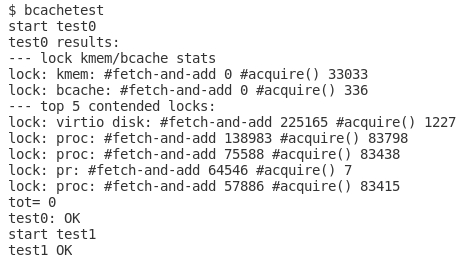MIT6.S081 Lab7
Lab7 Lock
Memory allocator
This section is to make kalloc and kfree parallelly performed. The main idea is the free-list is shared among all CPUs so all CPUs need to serialize the allocation that we could improve this process by maintaining multiple freelist on different CPU.
Threads need to steal freepage from other CPU’s if its freelist is null. Actually we could let process steal more pages to reduces the frequency of starve for freelist. But I just do the lazy programing and make process steal one page per time.
If you add lock properly, this lab won’t be a big problem.
Buffer cache
Before starting the lab, xv6 book 8.2 to 8.3 section is definitely worthy reading. Namely, buffer cache is a layer between disk and logging and its exposed API is bwrite() and bread(). Because not like kalloc after allocation the page is in charge of single process, bcache’s buffer will be shared among all CPU and we can’t split them.
So we should use finer-grain lock to reduce the frequency of contention. According to the suggestion in the lab website, we could use a hash table to mapping <dev, blockno> to buf.
The new struct bcache should like following:
1 | struct { |
We need to modify two main functions, bget and brelse to acquire more parallelism .
There are two tricky point to write the correct code.
Ver1
Firstly, give a naive scheme:
1 | value := get_hash(dev, blockno); |
If we acquired lock in the line2 and want to do iteration in line 4-5, it may cause deadlock.
1 | Assume block b1 hashs to 2, b2 hashs to 5 |
To solve this problem, recall 4 conditions of deadlock:
- Mutual exclusion
- Hold and wait
- No preemption
- Circular wait
We can’t solve this deadlock by destroying mutual exclusion, no preemption and circular wait . Here gives an example of circular wait, because we have to iterate through all buckets to find an empty buffer, we can’t give a perfect order of visiting to avoid deadlock.
Ver2
So the only option is before acquiring other bucket’s lock, release current lock first.
But it comes with new problem, the window between the release and acquire is unsafe. It will cause two different threads seek for the same <dev, blockno> in two different empty buffer which violates rules. So we still have to lock.
Given the following pseudo-code:
1 | value := get_hash(dev, blockno); |
Note we should release() then acquire whole bcache's lock. If not may cause deadlock, for the similar reason that maybe exits one scenario that one process holds hash_table[value].lock and waits for bcache.lock and another process holds bcache.lock and waits for hashtable[value].lock in the later iteration.
Ver3
The window between release() and acquire() still have race condition, for the same reason and consequence mentioned in previous version. But since we lock the whole critical area from line. 7, no two threads will in line7-8 simultaneously, so we just need to check the hash_table[value] if a block is used at the beginning of acquire bcache's lock to keep synchronized.
1 | value := get_hash(dev, blockno); |
Some hint
- In multithreading programming, we could start with a coarse grain lock then reduce granularity step by step to meet the performance requirement.
- Once we want to hold two lock at one time, think carefully about ordering. (If somewhere exists a opposite acquiring sequence)
- Do transaction without lock, and before submitting we check the data consistency. If have a conflict, then we need handle this situation – Our design used this scheme which called Optimistic locking.


